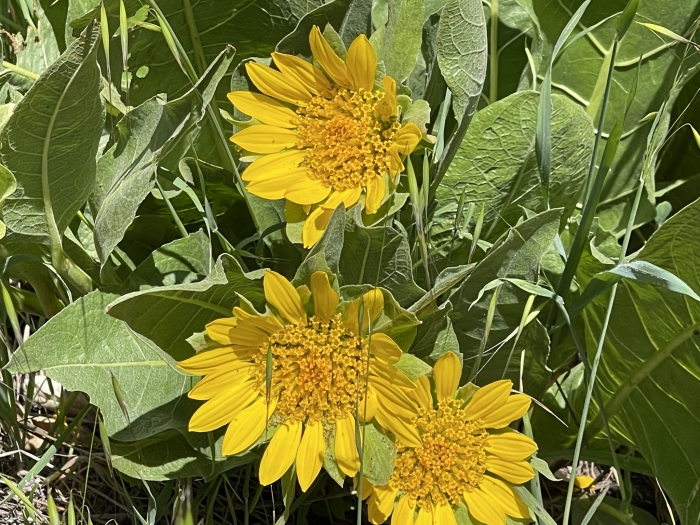Gray Mule’s Ears
(Wyethia helenioides)
Gray Mule’s Ears (Wyethia helenioides)
/
/

© rappman
CC BY 4.0
Image By:
© rappman
Recorded By:
Copyright:
CC BY 4.0
Copyright Notice:
Photo by: © rappman | License Type: CC BY 4.0 | License URL: http://creativecommons.org/licenses/by/4.0/ | Uploader: rappman | Publisher: iNaturalist |






























Estimated Native Range
Summary
Wyethia helenioides, commonly known as Gray Mule’s Ears, is a perennial herb that is native to the chaparral and open woodlands of the California Coast Ranges, Transverse Ranges, Peninsular Ranges, and the Sierra Nevada foothills. It typically grows to a height of 1-2 feet (0.3-0.6 meters) and spreads to a similar width. The plant is characterized by its large, basal, lance-shaped leaves that are gray-green and hairy, giving it a distinctive appearance. From late spring to early summer, it produces showy, golden-rayed flowers that resemble sunflowers and are highly attractive to pollinators.
Gray Mule’s Ears is valued for its bright, daisy-like flowers and its ability to thrive in dry, well-drained soils. It is often used in native plant gardens, wildflower meadows, and as part of restoration projects due to its low maintenance requirements and adaptability to drought conditions. In cultivation, it prefers full sun and requires minimal supplemental water once established. While generally disease-free, it can be susceptible to root rot in poorly drained soils.CC BY-SA 4.0
Gray Mule’s Ears is valued for its bright, daisy-like flowers and its ability to thrive in dry, well-drained soils. It is often used in native plant gardens, wildflower meadows, and as part of restoration projects due to its low maintenance requirements and adaptability to drought conditions. In cultivation, it prefers full sun and requires minimal supplemental water once established. While generally disease-free, it can be susceptible to root rot in poorly drained soils.CC BY-SA 4.0
Plant Description
- Plant Type: Herb
- Height: 0.3-2 feet
- Width: 0.5-1.25 feet
- Growth Rate: Slow, Moderate
- Flower Color: Yellow
- Flowering Season: Spring, Summer
- Leaf Retention: Deciduous
Growth Requirements
- Sun: Full Sun, Part Shade
- Water: Medium
- Drainage: Medium
Common Uses
Bee Garden, Butterfly Garden, Deer Resistant, Drought Tolerant, Low Maintenance
Natural Habitat
Native to the chaparral and open woodlands of the California Coast Ranges, Transverse Ranges, Peninsular Ranges, and the Sierra Nevada foothills
Other Names
Common Names: Gray Mule’s Ears, Woolly Mule’s Ears, White Mule’s Ears
Scientific Names: , Wyethia helenioides, Alarconia helenioides, Melarhiza inuloides,
GBIF Accepted Name: